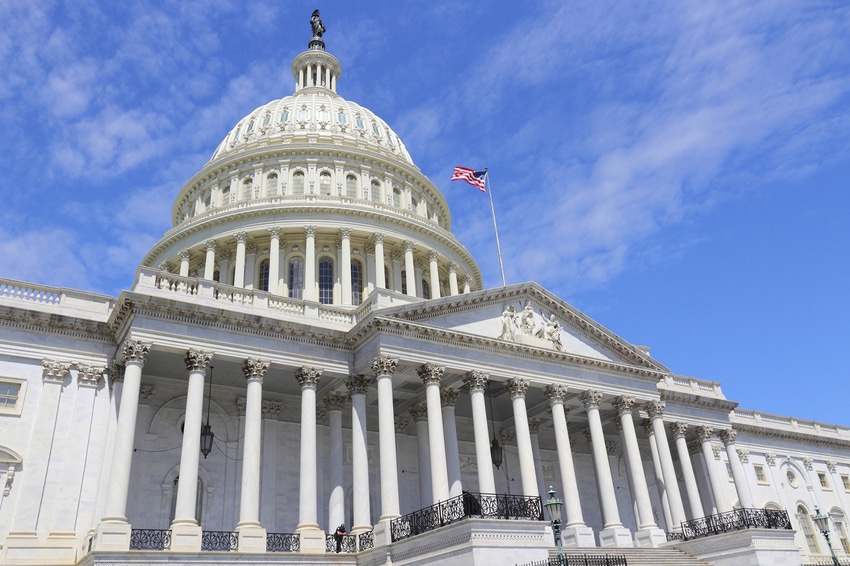Government averts shutdown and funds ag department
Several crucial riders for agriculture including in final funding package approved by Congress.

The House and Senate reached an agreement on a fiscal year (FY) 2019 spending package for the seven appropriations bills not yet signed into law. More than four months into the fiscal year, lawmakers passed the massive, $328 billion spending bill for 15 agencies and averted another shutdown.
The Senate on Thursday afternoon passed the measure 83-16 and the House followed in the evening, voting 300-128.
The ag portion of the bill offers $23 billion in total discretionary funding, including $550 million for a rural broadband pilot program.
"I am pleased that Congress has passed, and President Trump has signed, funding for USDA for the remainder of Fiscal Year 2019. We will be moving at full speed on all of our responsibilities, making good on our motto by doing right and feeding everyone," said Secretary of Agriculture Sonny Perdue in a statement.
A total of $2.775 billion was allocated to support agricultural research conducted by the Agricultural Research Service (ARS) and the National Institute of Food and Agriculture (NIFA), including $415 million for the Agriculture and Food Research Initiative (AFRI). It also provides a $1 million increase in ARS funding for each of the following: pulse crop health initiative; chronic wasting disease; sugarbeets; alfalfa research; small grain genomics. Maintains funding for UAS Precision Agriculture at $3 million and $8.7 million for the U.S. Wheat and Barley Scab Initiative.
The Food and Drug Administration received $3.068 billion in funding, including a $13.8 million increase for food safety activities. Funds for the food side of FDA would total over $1 billion, which is about $30 million more than Trump had requested for fiscal 2019 that began on Oct. 1.
The Natural Resources Conservation Service budget includes $983.5 million, which includes $150 million for Watershed and Flood Prevention Operations and $10 million for the Watershed Rehabilitation Program. USDA’s Rural Development received $3 billion, equal to the enacted FY2018 funding level.
The bill prohibits the closure of Farm Service Agency (FSA) county offices and provides funding to hire additional FSA county employees and loan officers. Overall the FSA included $1.617 billion, including full funding of estimated demand for farm loans.
The conference report directs USDA and FDA to formalize a joint framework for regulating cell-based protein production within 60 days of enactment which would require action by mid-April.
The American Veterinary Medical Association (AVMA) said in a statement it was pleased with funding levels provided for veterinary priorities in the bipartisan spending agreement as the bill maintains and increases funding for important animal health and welfare programs housed USDA, FDA and National Institutes of Health.
Of particular importance to veterinary medicine, the bill provides funding to fill anticipated workforce needs for the National Bio and Agro-Defense Facility (NBAF), a planned biocontainment laboratory for the study of diseases that threaten both animal agriculture and public health. Congress also included an increase of $10.6 million for veterinary diagnostics within the USDA’s Animal Plant and Health Inspection Service to support NBAF efforts.
Additionally, the bill increases funding for animal health research, including an increase of $15 million for the USDA’s AFRI. The agreement also increases funding for the Veterinary Services Grant Program – which helps address rural shortages of food animal and public health veterinarians through educational efforts or practice enhancement – from $2.5 million to $3 million.
With the passing of the appropriations bill it includes a continued electronic logging device (ELD) delay until September 30, 2019, an important item for those in the livestock industry. The bill language specifically stated, “SEC. 131. None of the funds appropriated or otherwise made available to the Department of Transportation by this Act or any other Act may be obligated or expended to implement, administer, or enforce the requirements of section 31137 of title 49, United States Code, or any regulation issued by the Secretary pursuant to such section, with respect to the use of electronic logging devices by operators of commercial motor vehicles, as defined in section 18 31132(1) of such title, transporting livestock as defined in section 602 of the Emergency Livestock Feed Assistance Act of 1988 (7 U.S.C. 1471) or insects.”
“Even with the passage of the appropriations bill, Congress still has unfinished business in areas of great concern for USDA and the customers we serve. Farmers and ranchers were battered last year by a series of monumental storms, robbing them of their livelihoods and inflicting damage well beyond the financial risks they normally assume in their operations. These are the men and women who dedicate their lives to feeding, fueling, and clothing this nation, and we cannot turn our backs on them when they need assistance," Perdue said.
About the Author(s)
You May Also Like





